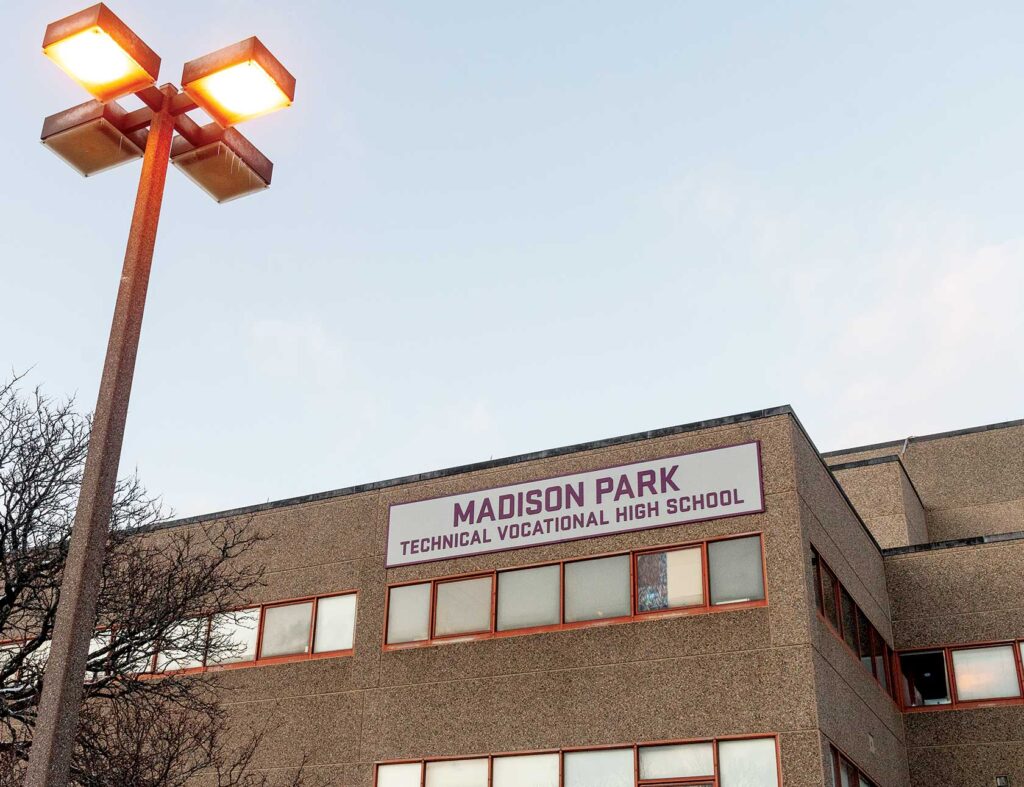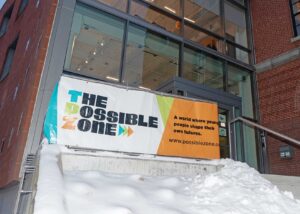BPS partnership aims to make computer science careers ‘Beyond Possible’

When Raven Tukes considers the computer science industry, she said she sees a field amid rapid change — made even faster by the surge of AI — but one with a lot of potential for opportunities.
A new college pathway initiative being launched by Boston Public Schools will aim to connect its students with those opportunities. The program, called “Beyond Possible,” will offer students hands-on experience in computer science with college-level classes.
“When we say, ‘Beyond Possible,’ we want students to imagine the many possibilities and beyond those that they could have in pursuing a future in computer science and data analytics,” said Tukes, vice president of partnerships at The Possible Zone, one of the organizations involved in the program.
The college pathways program is a collaboration between Boston Public Schools; Wentworth Institute of Technology, which will provide the college-level courses; and The Possible Zone, a Jamaica Plain-based educational nonprofit that will offer additional programming and other supports like meals and a stipend for students.
Megan Reed, executive director of strategy and operation in the BPS Office of Secondary Schools, said the program is about opening more doors for all BPS students.

The Possible Zone, a Jamaica Plain-based educational nonprofit, shown Feb. 10. The school is one of four Boston Public high schools that are included in a three-way college pathways program partnership between the district, Wentworth Institute of Technology and The Possible Zone aimed at increasing access to the computer science industry. PHOTO: AVERY BLEICHFELD/BAY STATE BANNER
“Everything that we are doing in our work around pathways and building out core sequences is a very clear statement on the fact that we feel like our kids deserve to walk into any space and if they’re not given a seat, to take it,” she said.
The program will launch its first official cohort in August, with a weeklong coding boot camp to make sure students are prepared for Wentworth’s coursework.
Over the next two years, students will participate in four computer science classes run by Wentworth as well as three classes run by The Possible Zone, plus summertime experiences shadowing industry jobs and interning in the field.
“While it is very much a college access program … they will also have an opportunity to have internships in computer analytics and have mentors and be connected with folks that are that are in the field,” Tukes said.
Over the next few months, the program will start to kick into gear. Staff from The Possible Zone are conducting outreach now and intend to bring about 60 students into the four-day, deep-dive programming over February and April school breaks to explore interest and get their feet wet. Of those participants, 30 will join the program’s first cohort.
For Tukes, it’s important that this effort to bring more BPS students into these fields comes during a broader push to diversify across science, technology, engineering, and mathematics disciplines. According to a report from Enterprise Apps Today, a tech industry trade publication, as of 2019, Black Americans made up 7% of tech employment, but 14% of the U.S. population.
“I do see this program as a real opportunity to get our students up to speed on what’s happening but then empowering them to be a part of the movement that’s happening more broadly in the computer science landscape with AI,” Tukes said.
And, she said she sees The Possible Zone as the right organization to take part in that work. Already, the program has experience bringing students from diverse backgrounds into STEM.
“The types of students that we serve have typically been left out of these types of opportunities,” she said. “There’s a steep learning curve to bring students into what this industry is about.”
Reed, too, highlighted the experience that The Possible Zone brings, pointing to a cohort of instructors and existing students who already reflect a more diverse landscape.
As the program has started to move toward its official start, Reed said she’s seen the potential for change she thinks this program presents. In informational sessions for students and their families, she said she has looked around and seen the faces of kids who don’t look like the people normally represented in tech spaces.
“To be in a space where there’s Black and brown kids, multilingual learners, female-identifying students, and to see that as the future of coding and computer science and data analytics — those fields have been pretty marginalizing to our kids,” Reed said.
Tukes and Reed said the program also aims to accommodate the diversity of the students it will serve by working to support a variety of pathways after completion. Students who graduate from the program will receive conditional college acceptance at Wentworth or at Framingham State University if they’re looking to get a bachelor’s degree, or Massachusetts Bay Community College for students seeking an associate degree. It will also have pathways to career training programs.
“We’re in this work to ensure that our students can make choices for themselves and that they can sustain themselves and have the freedom that comes with financial viability — the freedom to have a family, to make choices to change,” Reed said.
And the program, too, offers wrap-around services for students like meals, counseling and stipends for showing up that increase the longer the student continues to participate.
“It’s really about retaining students in an enriching learning experience that is going to set them apart and help them be competitive in today’s society,” Tukes said.
Those supports are also important to expanding which students might be willing to get involved.
“Some students would sign up for this regardless — no stipend, no food, no counseling — because it’s of interest to them and they’re seeking ways to attain credits,” Reed said. “And I want this to serve those students, but we’re also really interested in serving students who can’t quite yet see themselves in those seats, and with that, that would struggle without the supports that TPZ is going to provide.”
Those sorts of supports, she said, are a chance to change what a “natural course” might be for students otherwise, based on cultural factors that exist.
“In order to be a game changer, you have to sort of like to do things differently,” Reed said. “I think the supports that TPZ provides really allows us to disrupt the way that traditional programming can feel for kids and what they can experience.”
For now, the program is starting small, with its intended 30 students from four pilot schools — English High School, Dr. Albert D. Holland High School of Technology, Madison Park Technical Vocational High School and John D. O’Bryant High School — but Tukes said staff at The Possible Zone hopes it will grow to include more schools. And, over the next three academic years in total, the program is aiming to support 160 students.
In its early days, Reed said she hopes it will “start well” — she cautioned against planning on too much expansion before the program is fully established — but said she hopes the partnership between the three organizations will empower the students who participated.
But, as it grows, the program could also become a sustainable model that other nonprofits could use to develop college pathway programs, Tukes said.
Currently, she said, most programs are brokered between higher education institutions and school districts, but introducing a nonprofit like The Possible Zone brings in an important community element that can bring more students — including some of the ones already participating in other programming through The Possible Zone — onto this new college pathway.
Having the three organizations in partnership has also led to more dynamic conversations and a program that BPS couldn’t create on its own and that it hadn’t previously developed in its work with either organization — both of which it partners with in other contexts.
“I think we’re taking the best of these three entities to provide students with a really unique opportunity that they didn’t have before,” Reed said.
Bringing all three organizations together also helps address an issue she said exists more broadly: that in education there is often a lot of great work all happening in vacuums.
“I think a lot of times in education, there are so many great ideas at so many different organizations that are doing really great work and impactful work, but very siloed work,” Tukes said. “We’re not trying to recreate the wheel; we’re trying to really build on an ecosystem and foster an ecosystem of resources for young people.”






